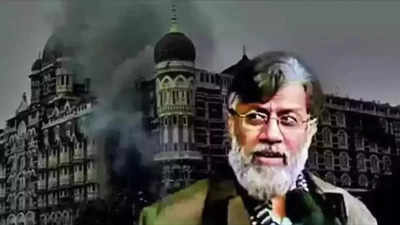NEW DELHI: Tahawwur Hussain Rana, a key accused in the 26/11 Mumbai terror attacks, will finally reach India after being extradited from the United States after over a decade of legal wrangling. A multi-agency Indian team is en route with Rana, and he is expected to land in India by Thursday afternoon, according to media reports citing sources.
The 64-year-old Pakistani-origin Canadian businessman is accused of helping David Coleman Headley, his childhood friend and co-conspirator, carry out reconnaissance of targets later attacked by Lashkar-e-Taiba (LeT) terrorists in 2008. The siege left 166 dead, including six American nationals, and lasted for nearly 60 hours.
What happens when Rana lands in India?
Upon arrival, Rana is likely to be produced before a special National Investigation Agency (NIA) court at Patiala House in Delhi. The NIA is expected to seek custodial interrogation to confront him with evidence, including emails, travel records, and testimonies already collected.
Officials believe Rana’s questioning could provide fresh leads on the involvement of Pakistani state actors in the attack. He may be lodged in a high-security cell in Tihar Jail, where security has already been tightened.
India had earlier given assurances to US authorities regarding Rana’s safety, legal rights, and prison conditions—a key factor in securing his extradition.
Rana’s role in 26/11: From visa scam to target mapping
According to the NIA charge sheet filed in 2011, Rana was deeply involved in planning the 26/11 attacks. He allegedly helped Headley gain a visa to India and established a Mumbai office — ‘Immigrant Law Centre’ — as a cover for reconnaissance activities.
The agency claims Rana not only knew of Headley’s terror affiliations but actively supported him. He accompanied his wife on a tour through multiple Indian cities — Hapur, Delhi, Agra, Kochi, Ahmedabad, and Mumbai — between November 13 and 21, 2008. During these visits, Headley made dozens of calls to Rana.
Their collaboration extended to planning attacks on Chabad Houses and the National Defence College. Rana was also in touch with Major Iqbal, a suspected ISI officer and co-conspirator.
Legal journey: From FBI arrest to Supreme Court denial
Rana was arrested by the FBI in Chicago in 2009 for supporting a failed LeT plot in Copenhagen. Though acquitted of direct charges in the 26/11 attacks by a US court, he was convicted for other terror-related offences and sentenced to 14 years in prison.
India has pursued his extradition since, filing a request and securing a Red Notice from Interpol. Rana resisted the process through multiple legal appeals, including two emergency stay applications this year—one each to US Supreme Court Justices Elena Kagan and Chief Justice John Roberts. Both were denied.
On April 7, the US Supreme Court formally rejected his last-ditch plea, stating simply: “Application denied by the Court.”
What’s next in the investigation?
The NIA hopes Rana’s interrogation will uncover more evidence about the network of conspirators, including LeT operatives Hafiz Saeed, Zaki-ur-Rehman Lakhvi, Sajid Mir, and HuJI leaders like Illyas Kashmiri—some of whom are linked to Pakistan’s ISI.
The NIA special court has issued non-bailable warrants against absconding accused and submitted letters rogatory to Pakistan, though no response has been received so far.
The NIA had earlier retrieved trial records from a Mumbai court, consolidating the multi-city legal effort into one court to streamline prosecution.
Why Rana’s extradition matters
Rana’s arrival in India marks a major breakthrough in the 26/11 case, which had seen only partial justice with the 2012 hanging of Ajmal Kasab, the lone surviving gunman from the attacks.
With Rana in custody, India may be able to expose the operational and institutional links between Lashkar-e-Taiba and Pakistani military-intelligence networks—potentially reopening diplomatic and legal pressure on Islamabad.
As India prepares for what could be one of the most consequential terror trials in its history, the return of Tahawwur Rana has reignited hope that long-delayed justice may finally be served.


